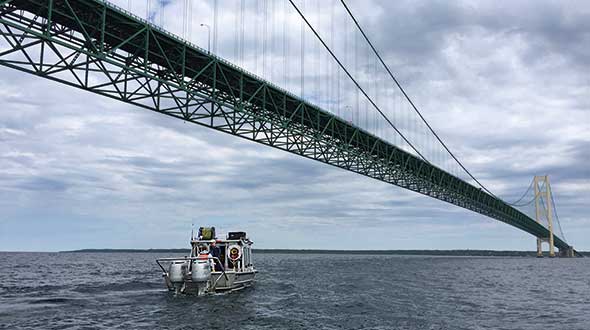Fast-tracked Michigan legislation forms authority to oversee Line 5 pipeline tunnel

Enbridge performs an external inspection of the pipeline near the Mackinac Bridge. Photo courtesy of Enbridge
Michigan Gov. Rick Snyder signed legislation creating a new authority to oversee the construction and operation of a tunnel under the Straits of Mackinac that will house a replacement segment for the controversial Line 5 petroleum pipelines.
Line 5 is a 65-year-old light crude oil and natural gas liquids pipeline that runs under the Straits of Mackinac in Michigan and serves as a key source of propane in the state and surrounding regions.
The legislation culminates a flurry of activity behind the scenes in which an initial agreement between the state of Michigan and pipeline owner Enbridge Energy to build the tunnel under the Straits fell apart. With the deal off, the future of Line 5 was called into question, creating propane supply uncertainty for the state and region.
“It’s huge – monumental, in fact,” says Derek Dalling, executive director of the Michigan Propane Gas Association (MPGA), who has been a key representative for the propane industry throughout the years-long process to address concerns about Line 5.
Dalling says educating stakeholders about the importance of the pipeline, that it crosses the Straits into the Lower Peninsula and impacts the entire state of Michigan and the surrounding areas, has been an ongoing challenge for MPGA. State leaders such as Snyder, state Sen. Tom Casperson and state Rep. Triston Cole have also supported the propane industry during the process, Dalling adds.
“Educating and talking to legislators not only about the Lower Peninsula, but also users outside of Michigan and those who come to Michigan for propane has been part of our education process,” Dalling says. “Education on the line itself and where all of that energy goes, its final destination, has been a huge eye-opening experience for everyone involved.”
Facing opposition from environmental groups, residents and some state officials concerned about the aging pipeline, the state of Michigan and Enbridge agreed in October to construct a new multi-use utility tunnel beneath the Straits and shut down the current segment of Line 5.
That deal, however, fell apart soon after, as some parties pushed back.
“In the middle of our meeting [the annual Leadership Summit on Nov. 28-29] in D.C., I got news that Enbridge walked away from the agreement for a period of time,” Dalling says. “It was absolutely devastating to us. We were very concerned. The fact that the governor continued to keep the agreement out there and Enbridge came back to the table and did come up with an agreement is a testament to how parties can work together and should work together.”
What resulted was Senate Bill 1197, which Casperson sponsored, to form the new Mackinac Straits Corridor Authority (MSCA). Snyder also appointed three members to the authority.
The process to write new state legislation that passed two chambers of the Michigan Legislature and received the governor’s signature was done in about a week.
“We were pretty impressed with how quickly everything fell into place,” Dalling says.
“This new law is the result of a tremendous effort by Sen. Casperson, my partners in the House and Senate leadership, and a diverse group of stakeholders, including business leaders and union representatives,” Snyder says in a press release. “We all understand the importance of bringing certainty to removing Line 5 from the waters in the Straits of Mackinac. By working together, they helped garner bipartisan support to ensure we are protecting the Great Lakes while securing better energy infrastructure for Michigan.”
Under agreements already signed between the state and Enbridge, the company will pay for 100 percent of design, construction, operation and maintenance of the tunnel for the next 99 years. The company also will decommission the twin pipelines in the Straits once the tunnel is complete. The project, which doesn’t yet have a clear timeline, is estimated to cost as much as $500 million.
The MSCA will own the tunnel after its construction and provide independent oversight throughout its life. The MSCA will be subject to the Open Meetings Act and the Freedom of Information Act.
The new law also creates a Straits Utility Fund to pay for the work of the MSCA, including independent experts to ensure construction and operation of the tunnel are done correctly. The MSCA, which will have administrative support from the Michigan Department of Transportation (MDOT), will be separate and independent from the Mackinac Bridge Authority (MBA) and MDOT. The MSCA will provide reports at least annually to the MBA and the MDOT director on construction progress and utility leasing.
The law requires the MSCA to enter into an agreement with Enbridge on the construction and operation of a Straits utility tunnel by Dec. 31, provided certain conditions are met. Prior agreements between Enbridge and the state of Michigan, several focusing on safety, remain in effect.
Dalling says the lesson for industry members is to continue to speak out on key issues throughout the year.
“The heavy lifting was done for the last couple of years on this issue,” he says. “The industry has contributed all along, and the final effort was done on the lobbying side. It speaks volumes to why you don’t wait until the last minute to lobby.”
Even with the agreement in place, Dalling expects obstacles in 2019 with Michigan’s new administration. Incoming Attorney General Dana Nessel has threatened legal attempts to shut down Line 5 when she takes office.
“Make no mistake,” Dalling says, “we don’t expect to see this end anytime soon.”
















